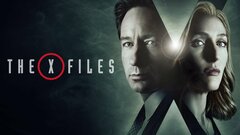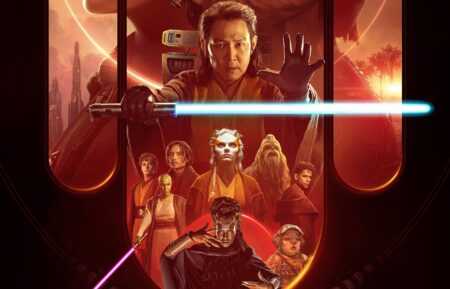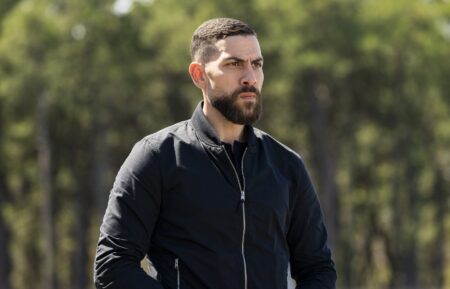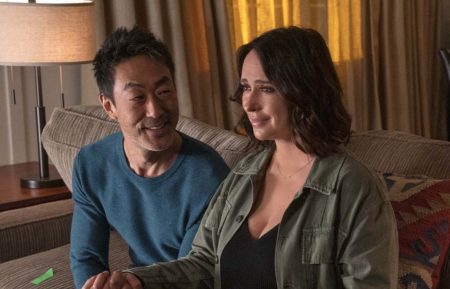‘X-Files’ Creator Chris Carter Explains Why the Series Came Back; Plus, See an Exclusive Clip of the First Ep (VIDEO)
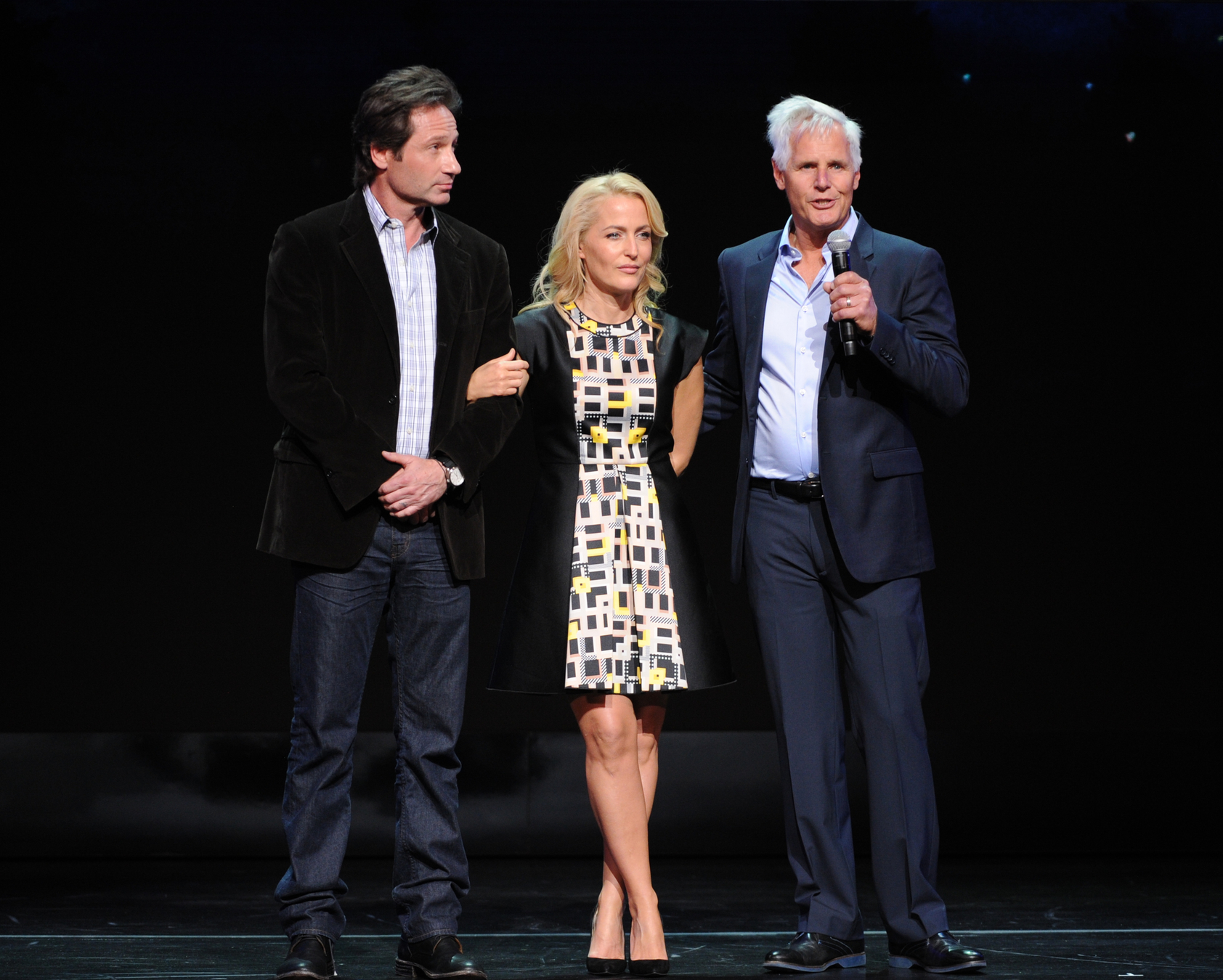
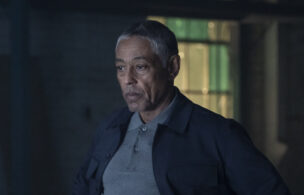
‘Parish’ Is Out for Justice in the Explosive Season Finale
Will Gray be forced to get his hands dirty? Get a sneak peek at the final episode of the AMC series.
The wait is finally over.
The X-Files returns to Fox tonight after the NFC Championship game, adding more questions to the show’s famed alien mythology, while also having some fun with a few new monsters of the week.
Late last fall, we sat down with The X-Files creator Chris Carter in his office to get the lowdown on what surprises are in store for Mulder and Scully. An edited transcript follows.
When did you finish up production, and how would you compare this process to the old process?
Chris Carter: We finished September 1st. It was very similar. We shot it still in eight days with a little bit of second unit. That was very familiar. The luxury here is that we had more of a run up to it and then we had a longer post-production schedule. It allowed us to perfect the effects in a way we wouldn’t on a 22-episode schedule.
David Duchovny and Gillian Anderson had a small window of availability. How did that inform the way you planned these episodes?
Carter: When it was determined that we would go to Vancouver, that told me we had certain wonderful resources, a great crew, people that we used to work with. Beyond that, I knew I had a hard in and hard out date roughly the beginning of June and the end of August. We made it.
RELATED: On The X-Files Set: An Extended Interview with Gillian Anderson and David Duchovny
Did you ever worry you might not?
Carter: There’s always an element of the unknown on the show, but you try to have as few variables as possible, and to hit your marks as well as you can. I thought we were going to have all the scripts written by the time we started. It turned out not to be the case. I had the first script written, Glen had the second script written, Darin had the third script written. I didn’t have the fourth script written. Jim didn’t have the fifth script written and I hadn’t even touched the sixth script, so I was playing catch up.
We did the X-Files reunion panel at Comic-Con in 2013. No one was ready then to commit to a limited-run X-Files series. How did the pieces eventually come into place?
Carter: Someone just reminded me that there was actually talk about doing a limited series at that Comic-Con event. Maybe I never thought it would take shape, but [later, Fox TV Group chairman] Dana Walden called me and said the actors were interested in doing a limited series. Would I be interested? I said, “If the actors are interested … I’d be interested.” We explored it for the next couple months and then, it took about five months of negotiations to get through the contractual process.
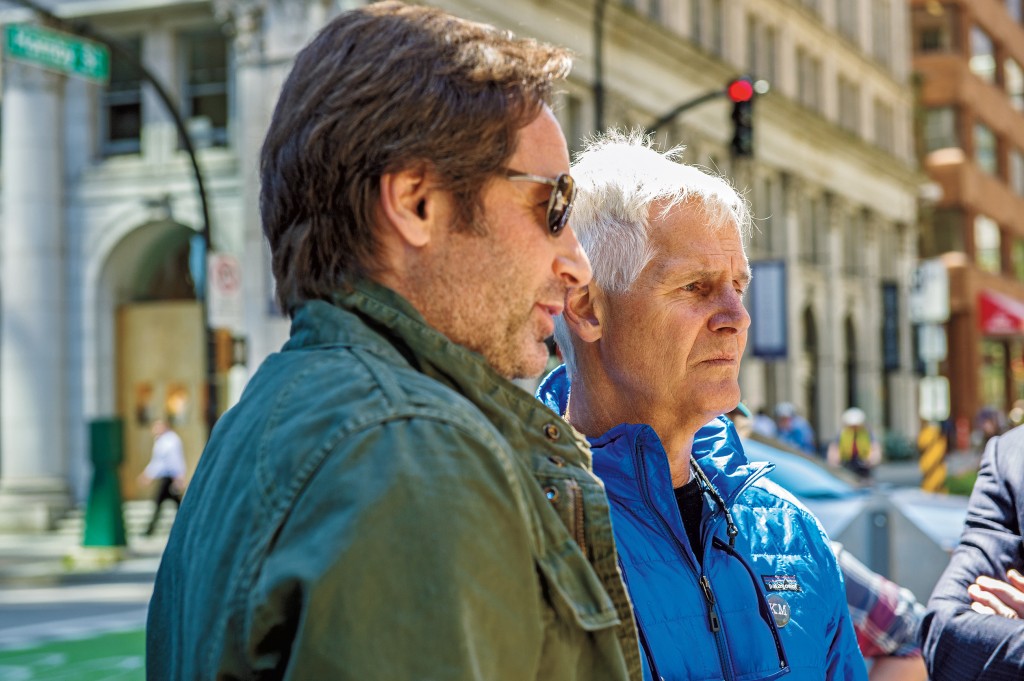
David Duchovny and Chris Carter
Which, as we know, is very important to all of you.
Carter: It is. Well, it’s important to everyone being happier or feeling like they’re starting from a constructive place rather than a destructive place. That everyone’s doing it in a team environment. That’s one of the most important things about a negotiation.
What were those initial conversations with David and Gillian like when this was starting to coalesce?
Carter: We all had breakfast at the L’Ermitage Hotel and talked about what we hoped to accomplish. I think we were basically all on the same page. They leave so many things up to me and I leave so many things up to them. We thought originally we were going to make the show in Los Angeles and Fox was determined to make it in Vancouver. We had talked about doing eight episodes. When the show was moved to Vancouver, that squeezed to six, which ended up being a lot of work anyway.
RELATED: Inside The X-Files Revival and What’s Coming for Scully and Mulder
Why did it squeeze to six?
Carter: That was all the time they had to do it that way. They both are parents now and they both have families. Commuting from Vancouver to New York or to London like they had to do is a little bit more of a trip than doing it from Los Angeles. Also, it was the summertime, so David’s family was going to be out in Los Angeles for the summer. His plans had foiled by then.
It was a nice hearken back to the beginning of the series in some way.
Carter: Yeah. It’s a good place to make the show.
When did you guys start to talk about just what you should do, what the show should look like, the balance between the mythology and the standalones?
Carter: That really was more conversations I had with Glen Morgan, who’s my executive colleague on the show, also the executive producer. We talked about it, then we would meet in his backyard with Darin [Morgan] and Gabe Rotter. Everyone had good ideas, what we hoped to accomplish, what we hoped to incorporate. Glen and Darin always have good and interesting ideas. They both had stories they wanted to do.
Who was able to do it? Who wasn’t able to do it?
Carter: Glen, Darin, and Jim [Wong] came back and wrote and directed their own episodes. I did three, so we didn’t bring any other directors back. We were able to bring Joel Ransom back, who was the [director of photography] on the last two years of the show in Vancouver. Mark Freeborn did the second movie and three years on Millennium. I’m working with him again. I worked with a producer in Vancouver for the first time, Grace Gilroy, who ended up being great. Same casting people both in Vancouver and L.A., same music, one of the same editors, same music supervisor, same sound supervisor. I was able to put the band back together in many respects, which was really nice.
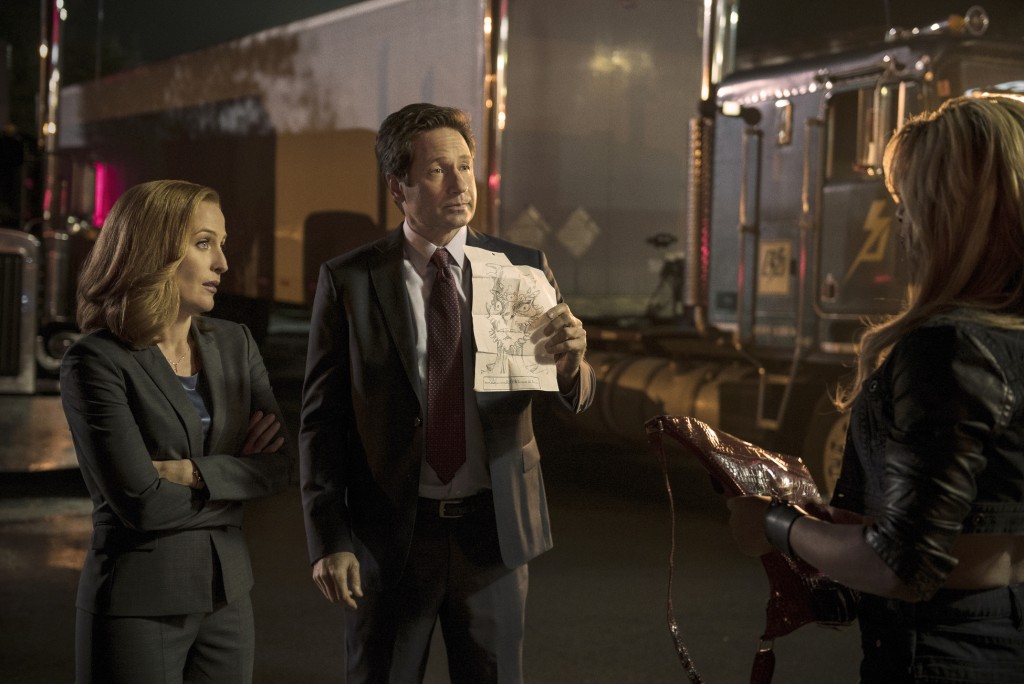
Gillian Anderson and David Duchovny in the “Mulder & Scully Meet the Were-monster” episode.
Talk about sitting down and writing a script with Mulder and Scully and revisiting these characters who meant so much for you for so long.
Carter: There had been talk of a third movie. On my own, I wrote a third movie as, I’ll call it, a study. None of it ever even appeared in the series of six, but I had explored it. It wasn’t as if I let those characters go for eight years, I was noodling.
RELATED: How to Watch 9 Seasons of X-Files in 4 Days
Even when you were doing other things, Mulder and Scully would pop up every once in awhile?
Carter: Every time I open the newspaper, I see a new X-Files story. I did this for so long. This has spanned three decades of my life. I’ve been doing it for so long, it’s part of my thought process.
Did you have to go back and explore the canon of the series?
Carter: A little bit. Yeah, I went back. There were things that I had forgotten we’d made, or where those turns were made. I knew what had happened. I wasn’t familiar with where it happened or when it happened.
You’ve switched up the conspiracy story. Why?
Carter: My feeling was that this had to follow perfectly from where the original series left off, but it didn’t necessarily have to take everything as gospel that had come before. I thought that was an interesting way to tell these stories. It was in keeping with what I’d been thinking about, certainly in keeping with the times that we’re living in.
This is the X-Files in a post-9/11, post-Edward Snowden world.
Carter: In my life–and I’m 59 years old–except for Watergate, I haven’t experienced a time when we have less trust in our government and our representatives. That’s an interesting time to be telling X-Files stories. When we went off the air in 2002, we had almost absolute trust in our government and our representatives to protect us. So many of those powers that we gave them have been abused. The shocking thing to me is how little outcry there is when we find out that they’re spying on us.
RELATED: Edward Snowden and 7 More Things That Inspired The X-Files Return
It’s almost expected, and maybe it’s because we were watching X-Files in the ‘90s that we’re not surprised.
Carter: I think it’s because Millennials freely give up their privacy online now thinking that nothing bad is ever going to happen, that that information might not be used against them at some point. Then you see things like the Ashley Madison hack. It’s a rude awakening that, in fact, anything that is put on the internet is essentially public information.
What’s interesting about the Joel McHale character is at first glance, he seems like a crackpot. But maybe he’s right.
Carter: There are five hundred conspiracy sites on the internet. You read them and there’s … Every one of them has elements of what I feel are sort of credible theories. There’s a lot of stuff that I just discount out of hand, but that’s just who I am. I’m a skeptic by nature. I’m interested in what is being put out there as alternative theories for things.
How did you cast Joel in the role?
Carter: I saw him do the White House Correspondents’ Diner and I thought, “This is the guy.” He was great and fearless. Also, I believe that comedians have great timing. It’s why Robin Williams made a terrific dramatic actor. They understand rhythm. I saw it in Joel McHale and he was an easy cast.
Take a first-look clip at Scully and Joel McHale’s character talking about Mulder:
Carter: It felt natural to me to bookend it with mythology episodes. In this case, it’s two mythology episodes to four standalone episodes. The percentage is much higher of mythology than to standalones as we would have done on the series, but it felt like a natural fit to me.
Two episodes doesn’t give you much time to really explore this change in mythology.
Carter: Yes. As you’ll see in episode six, we leave a lot open and unresolved.
Should we count on another season?
Carter: I don’t know… I think the proof will be in the pudding and ratings will be all important to anyone’s interest in going forward.
And what about that movie?
Carter: I don’t know. This is Twentieth Century Fox’s show. Twentieth Century Fox finances its future. They have to find a good reason to do that.
RELATED: Chasing the Truth That’s Still Out There
Let’s talk about Mulder and Scully and their relationship. You hint in that first episode that it has something to do with his depression, which led to a falling out.
Carter: I just imagine a guy who, if this is his fascination and fixation in life… That he would be spending a lot of time sitting in front of his computer searching for the truth. It’s a lonely existence. It’s a writer’s existence, really. I think that Scully, who is a doctor and who has separate interests, would find that to be, without the agency of the FBI, a hard life.
How long did that happen after the last movie?
Carter: I feel like after the second movie that they were happy together. They rode off to an island; they seemed like they were going to live happily ever after. I think several years passed and reality set in.
In Darin’s episode, Mulder is either having a mid-life crisis, or at least questioning his life’s work.
Carter: Especially with the internet, there’s a more popular sense of what is truly paranormal and what’s just craziness. At the same time, science seems to almost be outpacing science fiction these days. There’s plenty of interesting science that is open to exploration. There’s plenty of things in the genre that we haven’t explored, either.
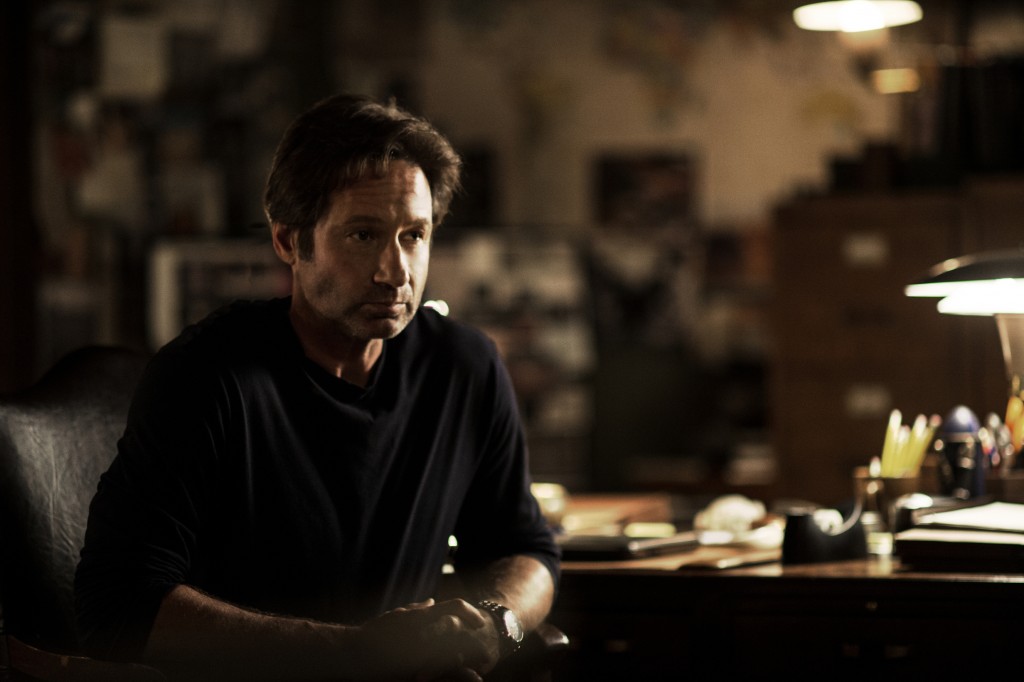
David Duchovny contemplates the truth that’s still out there.
So the Cigarette-Smoking Man isn’t dead.
Carter: Well, it looked like he was in the series finale.
It sure did, but I guess we never saw a body.
Carter: Right. I think you’re going to see the results of his convalescence after that experience. In episode six, you’re going to see exactly what the product of that failure to die was.
And we somehow get to see the Lone Gunmen.
Carter: It’s true. You see them in an interesting way in episode five. You’ll see them in a way you’ve never seen them before. Actually, you’ll see Mulder in a way you’ve never seen him before.
You’re bringing back several of the fan favorites.
Carter: I felt that there were certain command performances that you had to meet.
Fans will get to see the old office, the old poster…
Carter: Yeah. I think you had to hit certain notes. They were important. To see the pencils in the ceiling and to see that poster and that it had been lying dusty on the floor … If “I Want to Believe” is kind of the mantra of the show and Mulder and Scully are the beating heart of the show, you had to be very mindful of those two things.
What do you hope comes out of the revival?
Carter: I hope the hardcore fans are satisfied. They’re the reason we’re back. I hope that people who watched it or knew about it come to the show, but I hope that also there’s new viewers out there that are people who are too young or not even born yet to have experienced the show.
You may have a new generation go back and watch those original episodes.
Carter: I would be pleased if that happened. The starting date for Millennials is 1981. If we aired in 1993 to begin with, that means they were barely old enough to see the show. I think there’s another audience out there.
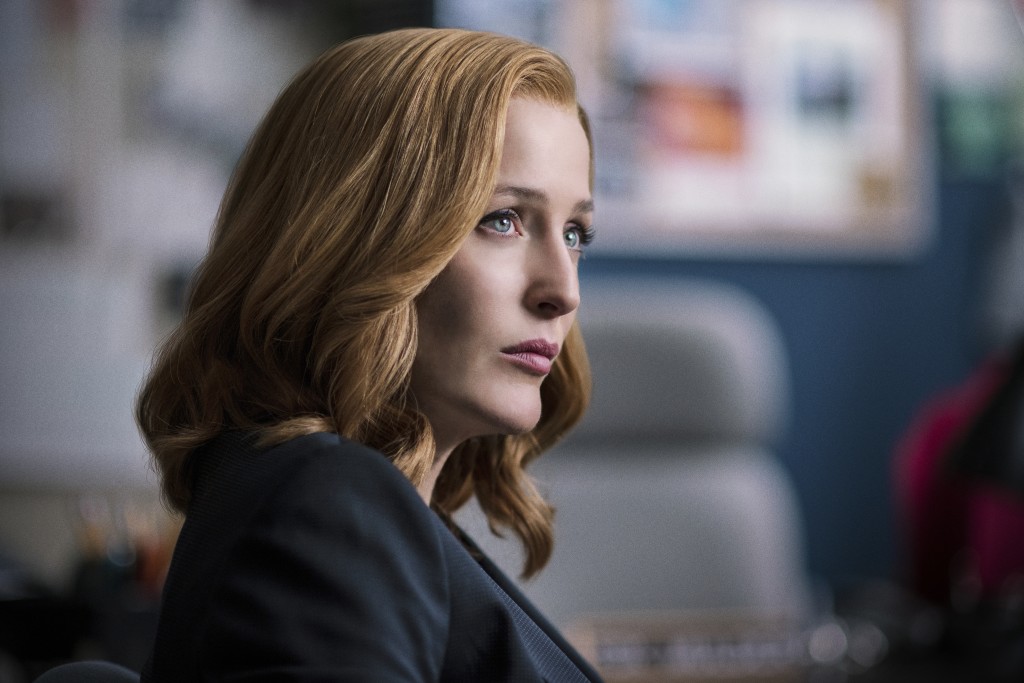
Gillian Anderson in the “Founder’s Mutation season premiere, part two.
They’re going to watch that first season and wonder why Mulder’s carrying that brick phone and why he won’t just go to the computer and Google stuff. But David and Gillian have barely aged.
Carter: Yeah, I know. They look great. That’s another reason to come back. It’s not like you’re bringing back grandpa and grandma. They still seem vital and young and the Mulder and Scully we always knew.
They’ve both done so much other TV work since The X-Files. Did you notice a difference in directing them and their acting?
Carter: Yes. In many cases, I watch the way Gillian works and I watch the way David works. It was a process. Even though I felt like they put on their Mulder and Scully shoes very comfortably, we had to find it in certain cases. There were nights where we struggled a little bit. There were times where we disagreed, but as often times is the case, it makes the work shine because everyone’s invested.
How did you feel being back in the driver’s seat?
Carter: It felt as natural as could be to me. I did three episodes, and it was a lot of work. It’s like directing a movie and a half. It took pacing. In the time I took off, I became a pilot. It’s really helped me to approach problem solving in a much more systematic way. When you become a pilot, you learn three things. You learn to aviate, but you also learn to navigate and communicate.
The X-Files, Premieres Sunday, Jan. 24, 10/9c, Fox (after the NFC Championship game) | Timeslot premiere: Monday, Jan. 25, 8/7c

